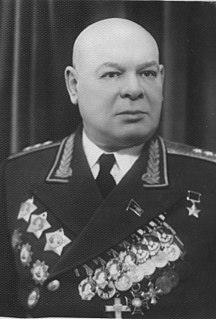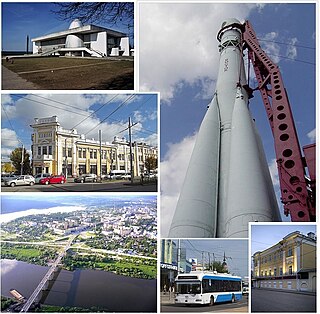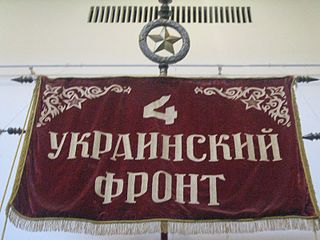
Nikolai Vasilievich Gogol was a Russian dramatist of Ukrainian origin.

Pavel Romanovich Popovich was a Soviet cosmonaut.

Kaluga Oblast is a federal subject of Russia. Its administrative center is the city of Kaluga. Population: 1,010,930.

Nikolay Pavlovich Pukhov was a Soviet Army colonel general and a Hero of the Soviet Union who commanded troops during World War II.

Mykola V. Tsybulenko (1942–1998) was a Ukrainian major general.
Nikolai Dmitriyevich Sergeyev was an Admiral of the Fleet and Chief of staff of the Soviet Navy.
Nikolai Kuryanovich ; 19 June 1966, Tulun, Irkutsk Oblast) - Russian politician, nationalist, Director of the Irkutsk branch of the Russian State Trade-Economic University, deputy of State Duma 4 convocation (2003-2007), member of the Central Council of the National Socialist Movement "Slavic Union".

Alexander Vasilievich Nikitenko was a well-educated Ukrainian serf of Count Sheremetev who was granted freedom under pressure from Kondraty Ryleyev and other men of letters. He narrowly escaped persecution in the wake of the Decembrist Uprising and served as censor through much of Nicholas I's reign. He was also a literary historian, censor, Professor of Saint Petersburg University, and ordinary member of St. Petersburg Academy of Sciences. Nikitenko is notable for a very detailed diary that he kept from an early age. It appeared in print in 1888-92; an abridged English translation was published in 1975.
Mikhail Vasilyevich Rudakov (1905–1979) was a Soviet military leader, Member of the Military Council of several Fronts during World War II, reaching service rank of lieutenant general.

Ivan Dziuba is a Ukrainian literary critic, social activist, Russian philologist, dissident, Hero of Ukraine, academic of National Academy of Sciences of Ukraine, the second Minister of Culture of Ukraine (1992—1994), Head of the Committee for Shevchenko National Prize (1999–2001).
Dmitry Vasilievich Belyaev was a Russian and Soviet painter, who lived and worked in Saint Petersburg, a Honored Artist of the Russian Federation, a member of the Leningrad Union of Soviet Artists, regarded as one of representatives of the Leningrad School of Painting.

Vasily Vasilyevich Glagolev was a Red Army Colonel general, Hero of the Soviet Union, and commander of the Soviet airborne (VDV). After initially serving in the Imperial Russian Army during World War I, Glagolev joined the Red Army in 1918. He rose to command the 42nd Cavalry Division on the Crimean Front in World War II, going on to command the 73rd and 176th Rifle Divisions as well as the 10th Guards Rifle Corps. Glagolev briefly became the commander of the 9th Army in February 1943 before being transferred to command of the 46th Army, which he would lead until May 1944. He became the 31st Army's commander and led it during the Vitebsk–Orsha Offensive. In January 1945, Glagolev commanded the 9th Guards Army, composed of Soviet airborne divisions converted into infantry. In April 1946, he became the commander of the Soviet airborne forces and died on in 1947 during exercises.

Nikolai Vasilyevich Kalinin was a Red Army Colonel general. He commanded the Soviet airborne from August 1987 to January 1989, after which Kalinin became the commander of the Moscow Military District. In August 1991, he supported the coup d'état attempt and was relieved of command after the coup failed. After retiring in 1993, Kalinin died on 7 March 2008.
Vladimir Vasilievich Nazarov is a Russian composer, singer, actor, film director, artistic director of the Music Theatre of National Arts, Professor Gnessin State Musical College. Honored Artist of the RSFSR (1987). People's Artist of Russia (2004).

Valery Vasilyevich Sudarenkov is a Soviet party and Russian politician, former 1st secretary of the Kaluga Regional Committee of the Communist Party, the former governor of the Kaluga Region and a representative of Kaluga Oblast in the Federation Council.

Nikolay Viktorovich Lyubimov is a Member of the State Duma of the Russian Federation VII convocation, Deputy Governor of the Kaluga Oblast (2011-2015), mayor of Kaluga in 2007-2010, and Acting Governor of Ryazan Oblast from February 14, 2017.

Nikolai Pavlovich Zhugan was an Air Force Major General, a pilot during the Great Patriotic War, and Hero of the Soviet Union (1944).

Pyotr Vasilievich Bazanov was a Soviet fighter pilot and flying ace in the 3rd Guards Fighter Aviation Regiment of the 235th Fighter Division in the 10th Fighter Aviation Corps of the 2nd Air Army on the 1st Ukrainian Front during the Second World War. For his actions in the military he was awarded the title Hero of the Soviet Union on 26 October 1944. He gained 22 individual aerial victories and six dual aerial victories in the war.
Nikolay Vasilievich Parijskij was a Russian surgeon and orthopedist. Professor, Doctor of Medicine, Active State Councillor.

Stanislav Yuryevich Kunyaev is a Russian poet, journalist, translator, and literary critic. Since 1989, he has served as editor of literary magazine Nash Sovremennik.























